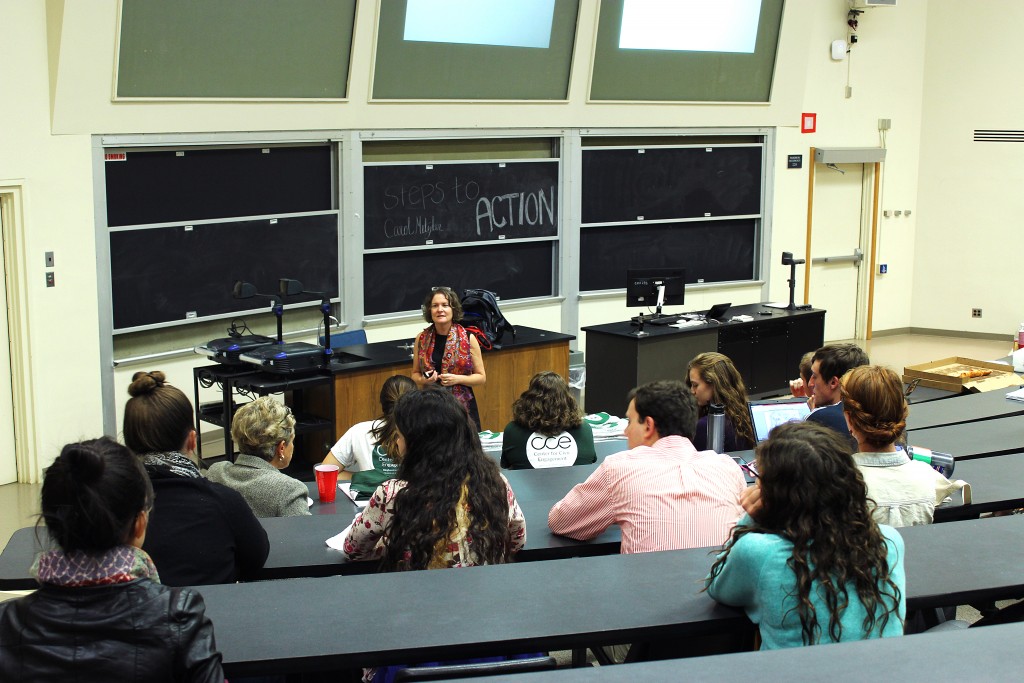
Though slavery was abolished in the United States in 1865, it is still prevalent throughout the world in the form of human trafficking. Activists like Carol Metzker are trying to do something about it.
On Tuesday night, Metzker spoke on the human impact of modern slavery in a talk entitled “Passion to Action: Human Trafficking.” The lecture, given as the second part of the Center for Civic Engagement’s Passion to Action speaker series, focused on the human costs of the industry where many are forced into sex work or forced labor.
Much of Metzker’s speech focused on the victims of human trafficking. According to her statistics, 80 percent of those trafficked into the United States are sex workers, around 13 percent are laborers not involved in sex work, five percent are involved in both and the rest are uncategorized. The last case of trafficking in Broome County was in January 2015.
Metzker offered practical advice to audience members if they are ever in a situation where they think someone could possibly be a victim of trafficking, such as seeing a younger girl with an older man either alone or during school times. She advised them to always make a call, either to the National Human Trafficking Resource Center or to the local police.
“If you make a call and you are wrong, nothing happens,” Metzker said. “If you make a call and you are right, you could save a life.”
She became involved in the cause while vaccinating children against polio in Asia with Rotary International, and her presentation contained pictures of many of the formerly exploited children that she met during her travels. She also discussed how people find themselves in situations where they are most likely to be a victim.
“When people are isolated,” Metzker explained, “when they don’t have love and don’t believe in themselves, they become more vulnerable to traffickers because traffickers are con artists.”
In reference to sex trafficking victims, Metzker addressed the stigmas and perceptions associated with the issue. The stigma around sex, she said, prevents earnest discussion about trafficking and the dangers of buying sex.
“When we begin to think of these folks as victims, we treat them differently,” she said. “If we start getting them help instead of arresting them, we actually tackle this problem.”
Many of Metzker’s comments concerned trafficking in and out of India specifically since much of her experience stems from her time in that country.
“There is a very high illiteracy rate, a huge amount of poverty, not eating, people sleeping in railway stations,” Metzker said. “Something else India has that is different is a population of one billion people. Criminals see people as more disposable than somewhere else.”
Audience members were also encouraged to contribute to the dialogue on the subject. Leslie Martinez, a first-year graduate student studying public policy in administration, responded to a question posed to the audience about why she personally believes India experiences more human trafficking than other areas.
“I think there are a variety of reasons that trafficking is a problem in India,” Martinez said. “The perception of women, the child marriages, the fact that women are supposed to be reliant on men and the fact that children have to work in some places.”
Metzker added that helping out in local communities in any way is an effective means to fight trafficking.
“Any time you are working with feeding people that are hungry, helping the homeless,” Metzker said. “It is almost like you are inoculating them against human trafficking because now they have somewhere to go.”
As her talk concluded, Metzker told attendees that there is hope for solving this issue.
“This is not a happy subject,” Metzker said. “But it is a hopeful one because there are steps we can take to fight this.”


